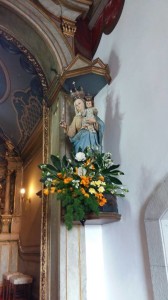FROM MY HEART TO YOUR HEART – Freedom to Love and to Forgive
Brought to you by Fr. Bernardino Andrade
Viktor Frankl, a medical doctor and psychiatrist, was born in Austria from a Jewish family, on March 26th, 1905, and died in California on September 2nd, 1997. He founded the school of Logotherapy that explores the meaning of the individual existence and the spiritual dimension of the human existence. I believe that his most famous book is the «Meaning of Life».
In 1942 Dr. Viktor Frankl, his pregnant wife and family were put in different concentration camps. He received the prisoner’s tattoo number 119.104. When the war ended he found out that his wife, his parents and all of his family had died in the horrors of the Nazis’ Holocaust.
One day, the guards in the concentration camp who had been trained to be mean and cruel, brought him to a big room. They put Viktor in the middle and made a circle around him. Then the commander with his strong and satanic voice looked at him and said: – “Undress. I want to see you completely naked.”
Humiliated in his dignity he had no choice. However, he looked peaceful and serene, which made the guards very upset. Actually, the peace and serenity he always expressed, even going through the atrocities of the concentration camp, were the main reason why they were so upset with him. After dropping all his clothes on the floor, Dr. Frankl was completely naked, surrounded by inhumane guards who found pleasure in torturing human beings. He just stood there, waiting for new orders. Again the commander looked at him and shouted:
– “Take off that stupid thing from your finger!” (That stupid thing was his wedding ring). At this time, he decided to talk and told them in a serene voice:
– “You have the power to torture my father, my mother and kill them along with all my brothers and sisters. You have the power to burn my house, torture and kill my wife and my baby she was carrying in her womb. Now you have the power to undress me and take away from my finger the last and the most meaningful possession I have ever had in this earth. But there is one thing you can not do…” – At this time all the guards were silent. They even forgot to interrupt him and slap him on his face.
– Then he ended like this:
– “But you can not take away from me the freedom that I have to love you and to forgive you.”
Fr. Bernardino Andrade
